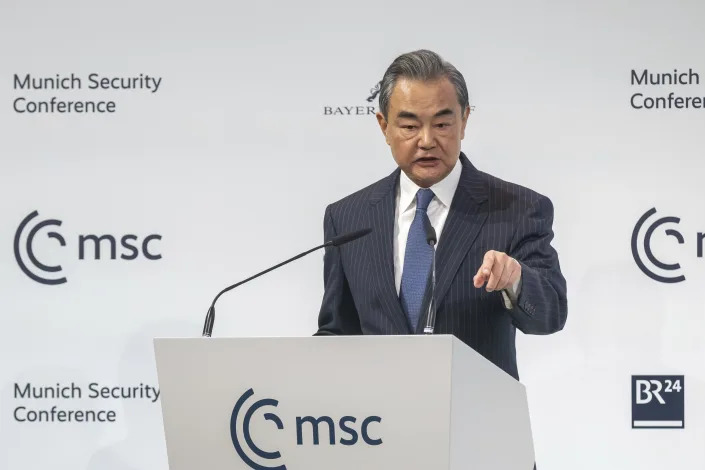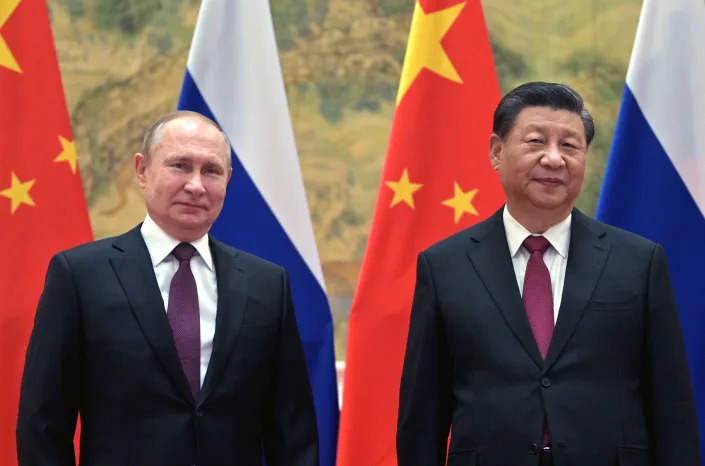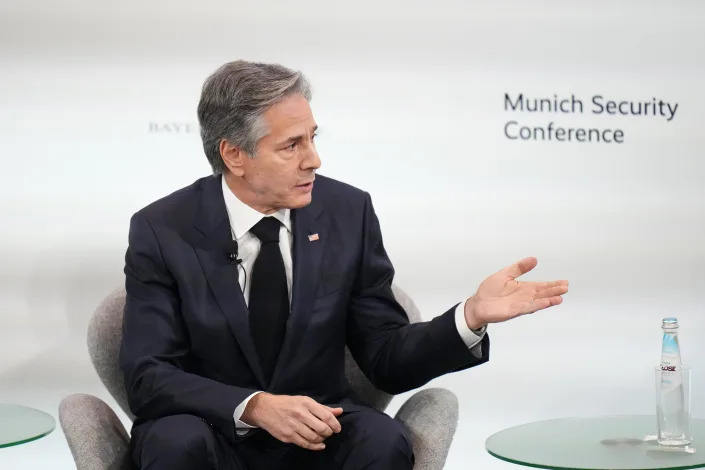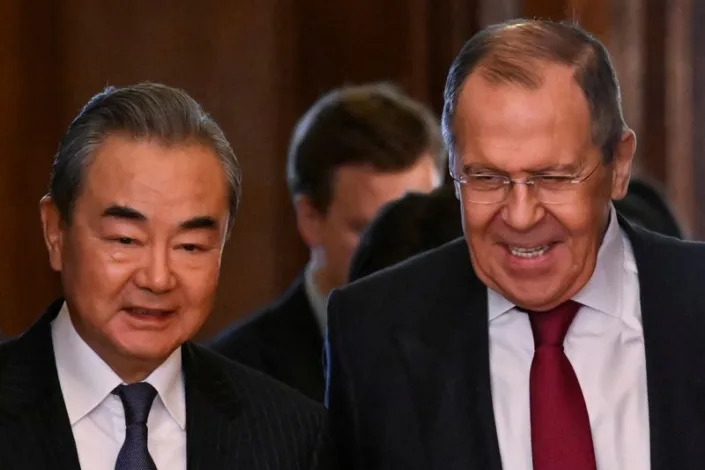


United States Secretary of State Antony Blinken attends a panel discussion at the Munich Security Conference in Munich, Feb. 18, 2023. One year into Russia's war against Ukraine, China is offering a 12-point proposal to end the fighting. (AP Photo/Petr David Josek, File)
Fri, February 24, 2023
TAIPEI, Taiwan (AP) — One year into Russia's war against Ukraine, China is offering a 12-point proposal to end the fighting.
The proposal follows China's recent announcement that it is trying to act as mediator in the war that has re-energized Western alliances viewed by Beijing and Moscow as rivals. China's top diplomat indicated that the plan was coming at a security conference this week in Munich, Germany.
With its release, President Xi Jinping's government is reiterating China's claim to being neutral, despite blocking efforts at the United Nations to condemn the invasion. The document echoes Russian claims that Western governments are to blame for the Feb. 24, 2022 invasion and criticizes sanctions on Russia.
At the Munich meeting, U.S. Secretary of State Antony Blinken expressed skepticism about Beijing's position before the plan's release. He said China has provided non-lethal assistance that supports Russian President Vladimir Putin's war effort and said the U.S. has intelligence that Beijing is “considering providing lethal support.” China has called the allegation a “smear” and said it lacks evidence.
WHAT HAS CHINA PROPOSED?
China’s proposal calls for a cease-fire and peace talks, and an end to sanctions against Russia.
China placed responsibility for sanctions on other “relevant countries” without naming them. These countries, it says, “should stop abusing unilateral sanctions” and “do their share in de-escalating the Ukraine crisis.”
Many of the 12 points were very general and did not contain specific proposals.
Without mentioning either Russia or Ukraine, it says sovereignty of all countries should be upheld. It didn't specify what that would look like for Ukraine, and the land taken from it since Russia seized Crimea in 2014.
The proposal also condemns a “Cold War mentality,” a term that often refers to the United States and the U.S.-European military alliance NATO. “The security of a region should not be achieved by strengthening or expanding military blocs,” the proposal says. Russian President Vladimir Putin demanded a promise that Ukraine will not join the bloc before the invasion.
Other points call for a cease-fire, peace talks, protection for prisoners of war and stopping attacks on civilians, without elaborating, as well as keeping nuclear power plants safe and facilitating grain exports.
“The basic tone and the fundamental message in the policy is quite pro-Russia,” said Li Mingjiang, a professor of Chinese foreign policy and international security at Singapore’s Nanyang Technological University.
DOES CHINA BACK RUSSIA IN ITS WAR ON UKRAINE?
China has offered contradictory statements regarding its stance. It says Russia was provoked into taking action by NATO’s eastward expansion, but has also claimed neutrality on the war.
Ahead of Russia's attack, Xi and Putin attended the opening of last year's Winter Olympics in Beijing and issued a statement that their governments had a “no limits” friendship. China has since ignored Western criticism and reaffirmed that pledge.
Putin has said he expects Xi to visit Russia in the next few months. China has yet to confirm that.
China is “trying to have it both ways,” Blinken said Sunday on NBC.
“Publicly, they present themselves as a country striving for peace in Ukraine, but privately, as I said, we’ve seen already over these past months the provision of non-lethal assistance that does go directly to aiding and abetting Russia’s war effort.”
HAS CHINA PROVIDED SUPPORT TO RUSSIA?
China’s support for Russia has been largely rhetorical and political. Beijing has helped to prevent efforts to condemn Moscow at the United Nations. There is no public evidence it is currently supplying arms to Russia, but the U.S. has said China is providing non-lethal support already and may do more.
Blinken, at the Munich conference, said the United States has long been concerned that China would provide weapons to Russia. “We have information that gives us concern that they are considering providing lethal support to Russia,” he said.
Blinken said he expressed to the Chinese envoy to the meeting, Wang Yi, that “this would be a serious problem.”
NATO's chief said Wednesday he had seen some signs that China may be ready to provide arms and warned that would be it would be supporting a violation of international law.
Russian and Chinese forces have held joint drills since the invasion, most recently with the South African navy in a shipping lane off the South African coast.
Ukraine’s defense minister Oleksii Reznikov expressed doubt about China's willingness to send lethal aid to Russia.
“I think that if China will help them … it will not (be) weaponry. It will (be) some kinds of like clothes,” Reznikov said in Kyiv Monday.
Explainer-What have Russia and China said about peace in Ukraine?

Russia's Foreign Minister Sergei Lavrov meets with China's top diplomat Wang Yi in Moscow BEWARE OF LAUGING ADVERSARIES
Thu, February 23, 2023
By Caleb Davis
(Reuters) - China's top diplomat Wang Yi held talks with President Vladimir Putin and other senior Russian officials in Moscow this week amid speculation that the two sides would discuss a Chinese plan to bring about peace in Ukraine after almost a year of war.
Moscow has denied that Wang and Russian Foreign Minister Sergei Lavrov discussed a specific proposal but both sides said they touched on political ways to end the conflict, with Russia welcoming what it called China's "balanced position".
Beijing has accused the United States and the West of fanning the flames of conflict in Ukraine, but it has refused to explicitly endorse Russia's invasion.
WHAT IS CHINA'S PEACE PROPOSAL?
China has said it will set out its position on how to settle the Ukraine conflict through political means in an upcoming paper, which Russian state media say will be published on the one-year anniversary of Russia's "special military operation".
Wang said at last week's Munich Security Conference that the document would reference principles from the United Nations' founding charter and take into account territorial integrity, sovereignty and security concerns.
"I suggest that everybody starts to think calmly, especially friends in Europe, about what kind of efforts we can make to stop this war," Wang said on Saturday.
Chinese President Xi Jinping is expected to deliver a "peace speech" on the Feb. 24 anniversary of the invasion, although analysts have cast doubt on whether Beijing's efforts to act as peacemaker will go beyond rhetoric.
NATO Secretary-General Jens Stoltenberg on Thursday warned China against supplying weapons to Russia. "We haven't seen any supplies of lethal aid from China to Russia, but we have seen signs that they are considering and may be planning for that," he told Reuters.
WHAT HAS UKRAINE SAID?
Ukraine said it was looking forward to hearing China's proposal but that it would need to examine it closely before reaching any conclusions, adding that President Volodymyr Zelenskiy had his own plan for peace.
"(Wang Yi) shared with me key elements of the Chinese peace plan," Foreign Minister Dmytro Kuleba said at a joint press conference with NATO Secretary General Jens Stoltenberg and EU foreign policy chief Josep Borrell on Tuesday.
"Once we receive the paper we will thoroughly examine it and come with our own conclusions," he said.
Zelenskiy last year proposed his own 10-point peace plan, which calls on Russia to withdraw all its troops from Ukraine and to respect Ukraine's territorial integrity.
Russia still controls nearly a fifth of Ukraine, despite losing swathes of land in major battlefield setbacks last year.
WHAT HAS RUSSIA SAID?
Russia said on Wednesday that it welcomed China taking a more active role in efforts to resolve the conflict.
"When it comes to addressing hot international issues, we and China share much of the same vision," Foreign Ministry spokeswoman Maria Zakharova said.
Weeks before the invasion, Putin and Xi agreed to a "no limits" partnership, as the two countries seek to counter-balance what they see as attempts by the United States to dominate global affairs.
Meeting Putin on Wednesday, Wang said China was willing to play a "constructive role" to end the Ukraine conflict.
"The Chinese side will, as in the past, firmly adhere to an objective and impartial position and play a constructive role in the political settlement of the crisis," Wang was quoted in Russian state media as saying.
Putin said Russia's relations with China were "developing" and said Xi would visit Moscow.
WHAT HAS THE WEST SAID?
Beijing's attempts to reach a peace deal and Wang's visit to Moscow have been met with a mixed reaction in the West, which believes Russia's increasing reliance on China make it one of the few countries able to truly influence Moscow.
German Foreign Minister Annalena Baerbock said China had an obligation to use that influence to seek peace in Ukraine.
"China, as a permanent member of the U.N. Security Council, is obligated to use its influence to secure world peace," said Baerbock, who also met Wang at last week's security conference.
The United States was sceptical, warning that Wang's visit to Russia on the eve of the war's first anniversary was more evidence of Beijing's growing alignment with Moscow.
"China is trying to have it both ways," said U.S. State Department spokesperson Ned Price.
"China is trying to broadcast and disguise itself in this veneer of neutrality, even as it deepens its engagement with Russia in key ways – politically, diplomatically, economically, and potentially in the security realm as well," he said.
Xi has stood by Putin during the conflict in Ukraine, resisting Western pressure to isolate Moscow.
Trade between the two countries has soared since the invasion, and China is Russia's biggest buyer of oil, a key source of revenue for Moscow.
(Reporting by Caleb Davis; Editing by Nick Macfie)
No comments:
Post a Comment